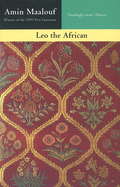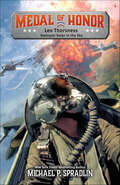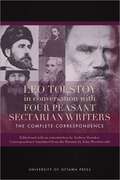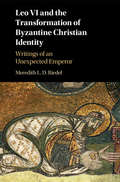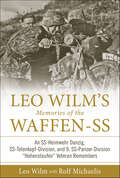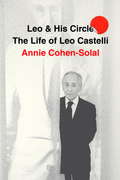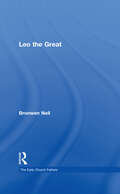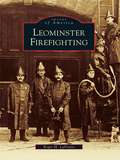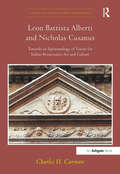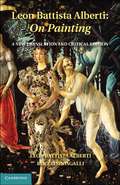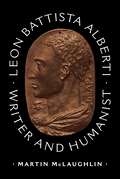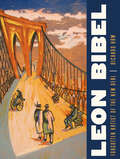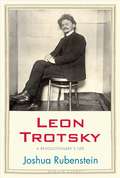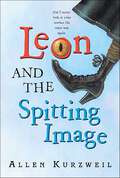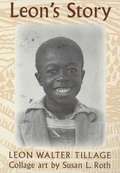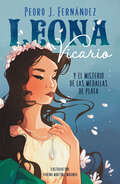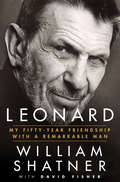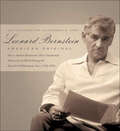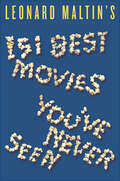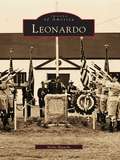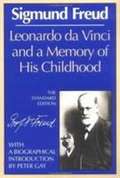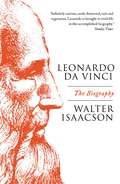- Table View
- List View
Leo The African
by Amin MaaloufFrom his chlidhood in Fez, having fled the Christian Inquisition, through his many journeys to the East as an itinerant merhcant, Hasans story is a quixotic catalogue of pirates, slave girls and princesses, encompassing the complexities of a world in a state of religious flux. Hasan too is touched by the instability of the era, performing his hadj to Mecca, then converting to Christianity, only to relapse back to the Muslim faith later in life. In re-creating his extraordinary experiences, Amin Maalouf sketches an irrisistible portrait of the Mediterranea world as it was nearly five centuries ago - the fall of Granada, the Ottoman conquest of Egypt, Renaissance Rome under the Medicis: all contribute to a background of spectacular colour, matched only by the picaresque adventures of Hasan's life.
Leo Thorsness: Vietnam: Valor in the Sky (Medal of Honor #3)
by Michael P. SpradlinFor middle-grade readers, the true story of a pilot in the U.S. Air Force who received the Medal of Honor for his great acts of aerial valor. Lieutenant Colonel Leo K. Thorsness was a Wild Weasel pilot in the Vietnam War, targeting enemy missile sites. On a 1967 mission, when his wingmen ejected from their burning aircraft, Thorsness initiated attacks on enemy planes and other daring maneuvers in order to protect them. Two weeks later, he was shot down and would become a P. O. W. for the next six years.This is the third nonfiction middle-grade book in the Medal of Honor series, which profiles the courage and accomplishments of recipients of the Medal of Honor, the highest and most prestigious personal military decoration, awarded to recognize U.S. military service members who have distinguished themselves through extraordinary acts of valor.
Leo Tolstoy in Conversation with Four Peasant Sectarian Writers: The Complete Correspondence
by Andrew DonskovAndrew Donskov takes a critical look not only at Tolstoy’s attitude towards the peasant class he so often championed for their simple ways and freedom from upper-class sophistication and pretentiousness, but more importantly, gives voice to representatives of the peasant class itself. The theme of the peasantry is central throughout most of Tolstoy’s long career. His obsession with this class is seen not just as a matter of social or humanitarian concern, but as a response to the questions of “how to live a good life” and “what is the meaning of life that an inevitable death will not destroy?” These questions plagued him his entire life. The letters he exchanged with the four major peasant sectarian writers (Bondarev, Zheltov, Verigin, and Novikov) reveal that Tolstoy was matched as a profound thinker by his correspondents, as they converse on religious-moral questions, the meaning of life and how one should strive to find it, and on a wide array of burning social and personal problems. Reading through the analysis and the extensively annotated letters as a unified whole, elucidates the progressive development of the ideas they shared (and where these diverged) and which guided Tolstoy’s and his correspondents’ lives. Juxtaposing Tolstoy’s letters with those of his four sectarian correspondents makes them even more significant as it shows them in their original context – a dialogue, or conversation. Also, with the aim to present the conversation in an even broader context, Andrew Donskov briefly discusses Tolstoy’s relationship with peasants in general as well as with each of the four individual writers in particular. In addition, he provides a background sketch of two major religious groups, namely the Doukhobors and the Molokans, both of which still claim sizeable populations of followers in North America today. Originally published in 2008 by the Slavic Research Group at the University of Ottawa under the title Leo Tolstoy and Russian peasant sectarian writers: Selected correspondence, the expanded University of Ottawa Press edition includes 44 letters never published in English, out of the total 155 letters. Correspondence translated by John Woodsworth. Published in English.
Leo VI and the Transformation of Byzantine Christian Identity: Writings of an Unexpected Emperor
by Meredith L. RiedelThe Byzantine emperor Leo VI (886–912), was not a general or even a soldier, like his predecessors, but a scholar, and it was the religious education he gained under the tutelage of the patriarch Photios that was to distinguish him as an unusual ruler. This book analyses Leo's literary output, focusing on his deployment of ideological principles and religious obligations to distinguish the characteristics of the Christian oikoumene from the Islamic caliphate, primarily in his military manual known as the Taktika. It also examines in depth his 113 legislative Novels, with particular attention to their theological prolegomena, showing how the emperor's religious sensibilities find expression in his reshaping of the legal code to bring it into closer accord with Byzantine canon law. Meredith L. D. Riedel argues that the impact of his religious faith transformed Byzantine cultural identity and influenced his successors, establishing the Macedonian dynasty as a 'golden age' in Byzantium.
Leo Wilm's Memories of the Waffen-SS: An SS-Heimwehr Danzig, SS-Totenkopf-Division, and 9. SS-Panzer-Division “Hohenstaufen” Veteran Remembers
by Rolf Michaelis Leo WilmA firsthand account of Leo Wilm&’s six years at war in the Waffen-SS
Leo and His Circle: The Life of Leo Castelli
by Annie Cohen-SolalLeo Castelli reigned for decades as America's most influential art dealer. "Leo and His Circle" tells the story of his astonishing life and career.
Leo and the Lesser Lion
by Sandra ForresterA heartwarming family story set during the Depression that reads like a classic. Everyone's been down on their luck since the Depression hit. But as long as Mary Bayliss Pettigrew has her beloved older brother, Leo, to pull pranks with, even the hardest times can be fun. Then one day, there’s a terrible accident, and when Bayliss wakes up afterward, she must face the heartbreaking prospect of life without Leo. And that’s when her parents break the news: they’re going to be fostering two homeless little girls, and Bayliss can’t bear the thought of anyone taking Leo’s place. But opening her heart to these weary travelers might just be the key to rebuilding her grieving family. From the Hardcover edition.
Leo the Great (The Early Church Fathers)
by Bronwen NeilPope Leo I’s theological and political influence in his own time (440-461) and beyond far outweighs the amount of attention he has received in recent scholarship. That influence extended well beyond Rome to the Christian East through his contribution to preparations for the Council of Chalcedon and its outcome. For this he was alternately praised and vilified by the opposing parties at the Council. Leo made his views known through letters, and a vast number of homilies. While so many of these survive, Leo and his works have not been the subject of a major English-language socio-historical study in over fifty years. In this brief introduction to the life and works of this important leader of the early church, we gain a more accurate picture of the circumstances and pressures which were brought to bear on his pontificate. A brief introduction surveys the scanty sources which document Leo’s early life, and sets his pontificate in its historical context, as the Western Roman Empire went into serious decline, and Rome lost its former status as the western capital. Annotated translations of various excerpts of Leo’s letters and homilies are organised around four themes dealing with specific aspects of Leo’s activity as bishop of Rome: Leo as spiritual adviser on the life of the faithful Leo as opponent of heresy the bishop of Rome as civic and ecclesiastical administrator Leo and the primacy of Rome. Taking each of these key elements of Leo’s pontifical activities into account, we gain a more balanced picture of the context and contribution of his best-known writings on Christology. This volume offers an affordable introduction to the subject for both teachers and students of ancient and medieval Christianity.
Leominster Firefighting (Images of America)
by Roger H. LapointeIn 1820, a group of Leominster volunteers formed Engine Company No. 1 "in the interests of protecting the rights of the settlers in case of fire." Since then, more than 1,400 individuals have served as firefighters for the citizens of Leominster, each of them leaving behind a legacy that will never be forgotten. Leominster Firefighting features images, memorabilia, and photographs from the early days of the hand tubs and horse-drawn hose carts of the 1800s to the 20th century when motorized apparatus arrived. It provides a glimpse into the many traditions that have been passed from one generation to the next and a look into how fire has changed Leominster.
Leon Battista Alberti and Nicholas Cusanus: Towards an Epistemology of Vision for Italian Renaissance Art and Culture (Visual Culture in Early Modernity)
by Charles H. CarmanProviding a fresh evaluation of Alberti’s text On Painting (1435), along with comparisons to various works of Nicholas Cusanus - particularly his Vision of God (1450) - this study reveals a shared epistemology of vision. And, the author argues, it is one that reflects a more deeply Christian Neoplatonic ideal than is typically accorded Alberti. Whether regarding his purpose in teaching the use of a geometric single point perspective system, or more broadly in rendering forms naturalistically, the emphasis leans toward the ideal of Renaissance art as highly rational. There remains the impression that the principle aim of the painter is to create objective, even illusionistic images. A close reading of Alberti’s text, however, including some adjustments in translation, points rather towards an emphasis on discerning the spiritual in the material. Alberti’s use of the tropes Minerva and Narcissus, for example, indicates the opposing characteristics of wisdom and sense certainty that function dialectically to foster the traditional importance of seeing with the eye of the intellect rather than merely with physical eyes. In this sense these figures also set the context for his, and, as the author explains, Brunelleschi’s earlier invention of this perspective system that posits not so much an objective seeing as an opposition of finite and infinite seeing, which, moreover, approximates Cusanus’s famous notion of a coincidence of opposites. Together with Alberti’s and Cusanus’s ideals of vision, extensive analysis of art works discloses a ubiquitous commitment to stimulating an intellectual perception of divine, essential, and unseen realities that enliven the visible material world.
Leon Battista Alberti: On Painting
by Rocco Sinisgalli Leon Battista AlbertiLeon Battista Alberti was one of the most important humanist scholars of the Italian Renaissance. Active in mid-fifteenth-century Florence, he was an architect, theorist, and author of texts on perspective and painting. Leon Battista Alberti: On Painting is a cardinal work that revolutionized Western art. In this volume, Rocco Sinisgalli presents a new English translation and critical examination of Alberti's seminal text. Dr Sinisgalli reverses the received understanding of the relationship between the Italian and Latin versions of Alberti's treatise by demonstrating that Alberti wrote it first in Italian and then translated it into a polished Latin over the course of several decades. This volume is richly illustrated to help demonstrate how Alberti understood optics and art.
Leon Battista Alberti: Writer and Humanist
by Martin McLaughlinThe first book in English to examine Leon Battista Alberti&’s major literary works in Latin and Italian, which are often overshadowed by his achievements in architectureLeon Battista Alberti (1404–1472) was one of the most prolific and original writers of the Italian Renaissance—a fact often eclipsed by his more celebrated achievements as an art theorist and architect, and by Jacob Burckhardt&’s mythologizing of Alberti as a "Renaissance or Universal Man." In this book, Martin McLaughlin counters this partial perspective on Alberti, considering him more broadly as a writer dedicated to literature and humanism, a major protagonist and experimentalist in the literary scene of early Renaissance Italy. McLaughlin, a noted authority on Alberti, examines all of Alberti&’s major works in Latin and the Italian vernacular and analyzes his vast knowledge of classical texts and culture.McLaughlin begins with what we know of Alberti&’s life, comparing the facts laid out in Alberti&’s autobiography with the myth created in the nineteenth century by Burckhardt, before moving on to his extraordinarily wide knowledge of classical texts. He then turns to Alberti&’s works, tracing his development as a writer through texts that range from an early comedy in Latin successfully passed off as the work of a fictitious ancient author to later philosophical dialogues written in the Italian vernacular (a revolutionary choice at the time); humorous works in Latin, including the first novel in that language since antiquity; and the famous treatises on painting and architecture. McLaughlin also examines the astonishing range of Alberti's ancient sources and how this reading influenced his writing; what the humanist read, he argues, often explains what he wrote, and what he wrote reflected his relentless industry and pursuit of originality.
Leon Bibel: Forgotten Artist of the New Deal
by Richard HawLeon Bibel (1913–1995) was a prolific modern American artist who painted, printed, stamped, etched, sketched, and carved. He produced pieces that ranged from social realism to dreamy expressionism and was an aesthetic experimentalist, never working for too long in any medium or style. And despite Bibel's obvious talent, his work would have languished in obscurity were it not for the New Deal programs like the Federal Art Project and Public Works of Art Project. Leon Bibel, the first biography of this eclectic artist, recounts his life from his birth in Szczebrzeszyn, Poland, in 1913, to his death in New Jersey in 1995. After immigrating to the United States in the 1920s, Bibel came of age during the Great Depression, when New Deal agencies recognized his abilities and supported his artistic endeavors. Working-class artists faced challenges after these programs folded, and Bibel would later spend twenty years as a New Jersey chicken farmer before resurrecting his art career in the 1960s. Historian Richard Haw shows how Bibel's life was defined by the New Deal, his visionary artwork shaped by the era's commitment to social and economic justice. With reproductions of more than 240 of Bibel's works, most in vivid color, this book reveals how he depicted everything from the trauma of unemployment to the dignity of work, from the horrors of lynching to the pleasures of everyday life.
Leon Trotsky: A Revolutionary's Life
by Joshua RubensteinBorn Lev Davidovich Bronstein in southern Ukraine, Trotsky was both a world-class intellectual and a man capable of the most narrow-minded ideological dogmatism. He was an effective military strategist and an adept diplomat, who staked the fate of the Bolshevik revolution on the meager foundation of a Europe-wide Communist upheaval. He was a master politician who played his cards badly in the momentous struggle for power against Stalin in the 1920s. And he was an assimilated, indifferent Jew who was among the first to foresee that Hitler's triumph would mean disaster for his fellow European Jews, and that Stalin would attempt to forge an alliance with Hitler if Soviet overtures to the Western democracies failed. Here, Trotsky emerges as a brilliant and brilliantly flawed man. Rubenstein offers us a Trotsky who is mentally acute and impatient with others, one of the finest students of contemporary politics who refused to engage in the nitty-gritty of party organization in the 1920s, when Stalin was maneuvering, inexorably, toward Trotsky's own political oblivion. As Joshua Rubenstein writes in his preface, "Leon Trotsky haunts our historical memory. A preeminent revolutionary figure and a masterful writer, Trotsky led an upheaval that helped to define the contours of twentieth-century politics. " In this lucid and judicious evocation of Trotsky's life, Joshua Rubenstein gives us an interpretation for the twenty-first century.
Leon and the Spitting Image
by Allen KurzweilThis book is about a hotel full of animals. And an evil ice maker. And glass eyeballs -- oh, and really old panty hose and Possibly Fake Hair. But mostly, it's about Leon Zeisel and his epic quest to survive fourth grade, despite his teacher, Miss Hagmeyer, and his archenemy, Lumpkin the Pumpkin, a human tank with a deadly dodgeball throw. Luckily, Leon has friends who will stand by him even if his magical plans for rescue and revenge involve ... SPIT!
Leon's Story
by Leon Walter TillageThe son of a North Carolina sharecropper recalls the hard times faced by his family and other African Americans in the first half of the 20th century, and the changes that the civil rights movement helped bring about.
Leona Vicario y el misterio de las medallas de plata
by Pedro J. FernándezUna novela de suspenso histórico para niños en la que conoceremos las aventuras de Leona Vicario, espía independentista. Nueva España, 1810. Después de que una mujer desconocida le regalara una medalla de plata en el mercado, Leona Vicario comienza a recibir crípticos mensajes de un remitente desconocido, que la cita en el Templo de la Profesa. Pronto el misterio se hace todavía más grande: ¿quiénes son Los Guadalupes?, ¿qué quieren de ella?, ¿cómo saber quién apoya la independencia y quién es leal al virrey? Abriendo la puerta a una aventura que la llevará por todos los rincones de la capital, Leona emprende una carrera contra el reloj para luchar por el sueño de ver a México como un país libre. Convertida en una espía contra el virreinato, ¿cuál será el precio que tendrá que pagar por su silencio?
Leonard
by William Shatner David FisherLeonard Nimoy and William Shatner first crossed paths as actors on the set of The Man from U.N.C.L.E. Little did they know that their next roles, in a new science fiction television series, would shape their lives in ways no one could have anticipated. In seventy-nine television episodes and six feature films, they grew to know each other more than most friends could ever imagine. Over the course of half a century, Shatner and Nimoy saw each other through personal and professional highs and lows. In this powerfully emotional book, Shatner tells the story of a man who was his friend for five decades, recounting anecdotes and untold stories of their lives on and off set, as well as gathering stories from others who knew Nimoy well, to present a full picture of a rich life. As much a biography of Nimoy as a story of their friendship, Leonard is a uniquely heartfelt book written by one legendary actor in celebration of another.
Leonard Bernstein: American Original
by Barbara Haws Burton BernsteinOne of the most gifted, celebrated, scrutinized, and criticized musicians in the second half of the twentieth century, Leonard Bernstein made his legendary conducting debut at the New York Philharmonic in 1943, at age 25. A year later, he became a sensation on Broadway with the premiere of On the Town. Throughout the 1950s, his Broadway fame only grew with Wonderful Town, Candide, and West Side Story. And in 1958, the Philharmonic appointed him the first American Music Director of a major symphony orchestra—a signal historical event. He was adored as a quintessential celebrity but one who could do it all—embracing both popular and classical music, a natural with the new medium of television, a born teacher, writer, and speaker, as well as a political and social activist. In 1976, having conducted the Philharmonic for more than one thousand concerts, he took his orchestra on tour to Europe for the last time.All of this played out against the backdrop of post-Second World War New York City as it rose to become the cultural capital of the world—the center of wealth, entertainment, communications, and art—and continued through the chaotic and galvanizing movements of the 1960s that led to its precipitous decline by the mid 1970s. The essays within this book do not simply retell the Bernstein story; instead, Leonard Bernstein's brother, Burton Bernstein, and current New York Philharmonic archivist and historian, Barbara B. Haws, have brought together a distinguished group of contributors to examine Leonard Bernstein's historic relationship with New York City and its celebrated orchestra. Composer John Adams, American historians Paul Boyer and Jonathan Rosenberg, music historians James Keller and Joseph Horowitz, conductor and radio commentator Bill McGlaughlin, musicologist Carol Oja, and music critics Tim Page and Alan Rich have written incisive essays, which are enhanced by personal reminiscences from Burton Bernstein. The result is a telling portrait of Leonard Bernstein, the musician and the man.
Leonard Maltin's 151 Best Movies You've Never Seen
by Leonard MaltinWhat 151 movies have you never seen—but should?What French film could teach Hollywood how to make a smart, sexy romantic comedy? (page 233)Where will you find a female-centric Western with a gender-bending protagonist? (page 10)What film won a Special Jury Prize at Sundance and then fell off the radar? (page 261)What farcical comedy includes such real-life characters as Richard Nixon and Henry Kissinger? (page 50)In what unsung comedy will you find Michael Douglas giving his all-time best performance? (page 130)What debut film from the director of The Dark Knight creates palpable chills—despite a shoestring budget and a no-name cast? (page 79)What John Wayne movie was out of circulation for thirty years—and still qualifies as a sleeper? (page 121)What terrific Heath Ledger movie was released the same month as Brokeback Mountain—and flopped? (page 26)What clever modern-day film noir was made for just half a million dollars? (page 18)What captivating film stars one of the seminal artists of the twentieth century? (page 203)
Leonardo
by Holly BianchiLeonardo, one of Monmouth County's most picturesque seaside resorts, is portrayed in images that will fill the heart and lift the spirit. With some two hundred vintage photographs, Leonardo offers an overview of this beautiful beach town, which lies on the banks of the Sandy Hook Bay in central New Jersey. A tightly knit and friendly community, Leonardo has long been recognized as a haven for artists and writers. The town's sandy beaches and intriguing maritime history attract thousands of visitors every year.With a collection of early-twentieth-century to the recent past photographs and informative historical information, Leonardo explores the many features of a town that has become known as the "jewel in the crown." This history features images of Leonardo's celebrated sculptor and artist Donald DeLue, who created the sculpture The Rocket Thrower for the 1964-1965 New York World's Fair. Also seen are photographs of the Leonardo State Marina and the famous Conover Beacon Lighthouse. The historic Applegate Cemetery, where the legendary Mary Stillwell Applegate is buried, is pictured along with a description of its folklore tale.
Leonardo Da Vinci
by Kenneth Clark Martin KempA personally compelling introduction to Leonardo's genius, a classic monograph of Leonardo's art and his development.
Leonardo Da Vinci
by Steve AugardeThis illustrated biography series combines non-fiction and fiction to introduce readers to famous historical characters. Each book begins with a diary, told from the point of view of a child who works for the famous person. At the end of each book there is an illustrated reference chapter.
Leonardo Da Vinci and a Memory of His Childhood
by Sigmund FreudA detailed reconstruction of Leonardo's emotional life from his earliest years, it represents Freud's first sustained venture into biography from a psychoanalytic perspective, and also his effort to trace one route that homosexual development can take.
Leonardo Da Vinci: Cong Fan Ren Dao Tian Cai De Chuang Zao Li Mi Ma = Leonardo Da Vinci
by Walter Isaacson'To read this magnificent biography of Leonardo da Vinci is to take a tour through the life and works of one of the most extraordinary human beings of all time in the company of the most engaging, informed, and insightful guide imaginable. Walter Isaacson is at once a true scholar and a spellbinding writer. And what a wealth of lessons there are to be learned in these pages.' David McCullough Based on thousands of pages from Leonardo&’s astonishing notebooks and new discoveries about his life and work, Walter Isaacson weaves a narrative that connects his art to his science. He shows how Leonardo&’s genius was based on skills we can improve in ourselves, such as passionate curiosity, careful observation, and an imagination so playful that it flirted with fantasy. He produced the two most famous paintings in history, The Last Supper and the Mona Lisa. But in his own mind, he was just as much a man of science and technology. With a passion that sometimes became obsessive, he pursued innovative studies of anatomy, fossils, birds, the heart, flying machines, botany, geology, and weaponry. His ability to stand at the crossroads of the humanities and the sciences, made iconic by his drawing of Vitruvian Man, made him history&’s most creative genius. His creativity, like that of other great innovators, came from having wide-ranging passions. He peeled flesh off the faces of cadavers, drew the muscles that move the lips, and then painted history&’s most memorable smile. He explored the math of optics, showed how light rays strike the cornea, and produced illusions of changing perspectives in The Last Supper. Isaacson also describes how Leonardo&’s lifelong enthusiasm for staging theatrical productions informed his paintings and inventions. Leonardo&’s delight at combining diverse passions remains the ultimate recipe for creativity. So, too, does his ease at being a bit of a misfit: illegitimate, gay, vegetarian, left-handed, easily distracted, and at times heretical. His life should remind us of the importance of instilling, both in ourselves and our children, not just received knowledge but a willingness to question it—to be imaginative and, like talented misfits and rebels in any era, to think different.
